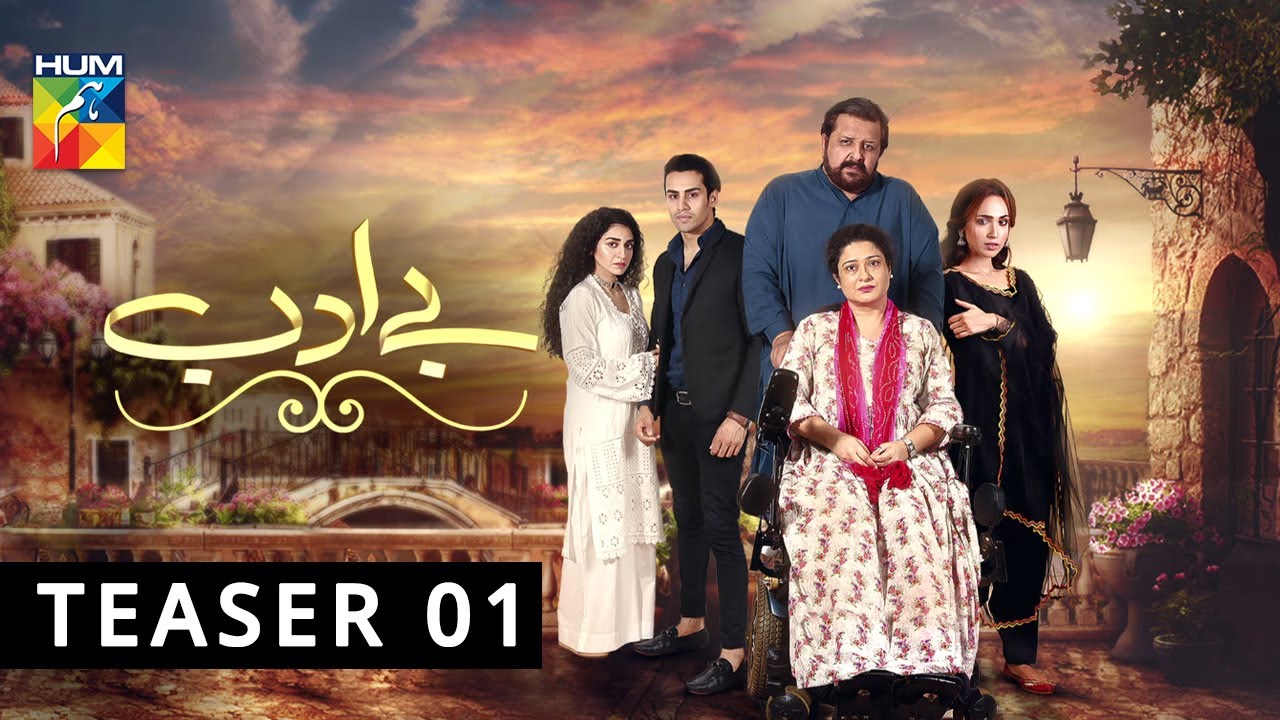Be Adab Drama Review: Be Adab (translates to “Respect”) is a 2017 Pakistani drama that garnered critical acclaim for its bold exploration of social injustice, class disparity, and the courage to stand up for what’s right. Written by the hard-hitting Faseeh Barlas and directed by the meticulous Waseem Abbas, the drama sheds light on the harsh realities faced by the underprivileged in Pakistani society. Be Adab is not just a compelling narrative; it’s a call to action, urging viewers to question societal norms and advocate for a more equitable world. This review delves into the drama’s strengths and weaknesses, offering a balanced perspective for potential viewers.
A Story of Resilience in the Face of Oppression
Be Adab centers around Sahira (Sadia Faisal), a strong-willed young woman residing in a poverty-stricken neighborhood. Sahira dreams of a better life for herself and her family but faces constant challenges due to her socioeconomic status. The narrative follows Sahira’s relentless pursuit of justice after she witnesses a brutal act of violence perpetrated by a wealthy and influential businessman, Daniyal (Fahad Mustafa). As Sahira seeks accountability, she faces threats, intimidation, and social pressures to remain silent. The drama also explores the lives of other characters affected by Daniyal’s actions, including Fahim (Muneeb Butt), a lawyer torn between his conscience and the fear of jeopardizing his career, and Saima (Aiman Khan), a woman trapped in an abusive marriage with Daniyal’s brother.
Stellar Performances Fuel the Narrative
The success of Be Adab hinges on the exceptional performances delivered by its cast. Sadia Faisal delivers a powerful portrayal of Sahira, capturing her vulnerability, determination, and unwavering courage. She showcases the emotional toll of seeking justice and the unwavering spirit required to fight for a better future. Fahad Mustafa portrays Daniyal with a chilling arrogance, highlighting the sense of entitlement enjoyed by the privileged few. Muneeb Butt delivers a nuanced performance as Fahim, showcasing the internal conflict faced by those caught between self-preservation and standing up for what’s right. The supporting cast, including Aiman Khan and Sania Shamshad, delivers impactful performances that enrich the narrative tapestry.
A Gripping Narrative with Social Commentary Woven In
Be Adab is not just a story of one woman’s fight; it’s a scathing indictment of a flawed social system. The drama exposes the power structures that favor the wealthy and leave the underprivileged vulnerable. It sheds light on police corruption, the lack of access to justice for the marginalized, and the societal tendency to silence dissent. By portraying these harsh realities, Be Adab compels viewers to confront uncomfortable truths and consider the importance of social reform.
A Stark Visual Representation of Inequality
Waseem Abbas’s direction utilizes a stark visual style that reflects the social and economic disparities within the narrative. Contrasting lighting is employed, with scenes in Sahira’s neighborhood bathed in harsh sunlight, emphasizing their poverty-stricken realities. In contrast, scenes within Daniyal’s palatial home utilize softer lighting and opulent décor, highlighting the vast difference in lifestyles.
A Flaw in the Narrative: The Bleakness
While Be Adab boasts a compelling story and exceptional performances, its relentless portrayal of injustice and hardship can be emotionally draining for viewers. The lack of clear victories for the characters throughout the narrative can leave viewers feeling hopeless.
A Show Worth Watching for its Social Impact
Despite its bleak moments, Be Adab remains a significant drama. The exceptional performances, the unflinching portrayal of social issues, and the importance of speaking out against injustice make it a worthwhile watch. The drama’s lasting impact lies in its ability to spark outrage against social inequality, inspire empathy for the marginalized, and encourage viewers to become advocates for change.
Character Complexity: Beyond Heroes and Villains
- Fahim’s Moral Transformation: Fahim’s journey as a character adds a layer of hope to the otherwise bleak narrative. His initial reluctance to take on Sahira’s case, fueled by fear and career concerns, highlights the challenges faced by those who wish to fight for justice within a corrupt system. However, as he witnesses Sahira’s unwavering courage and the plight of the victims, Fahim undergoes a moral transformation. He eventually utilizes his legal expertise to challenge the status quo, demonstrating the power of individual action and the importance of overcoming fear.
- Saima’s Strength in Silence: While Sahira is the vocal force for change, Saima’s character represents the silent victims of injustice. Trapped in an abusive marriage, she is unable to speak out for herself. However, her silent suffering and eventual decision to leave her abusive husband showcase a different kind of strength. Saima’s resilience in the face of oppression adds depth to the narrative.
- Daniyal’s Cracks in the Facade: Daniyal is not portrayed solely as a one-dimensional villain. The drama hints at a troubled past that may have contributed to his arrogance and sense of entitlement. While not excusing his actions, this complexity allows viewers to understand the root of his behavior, adding another layer to the narrative.
Symbolism and the Power of Storytelling
Be Adab employs powerful symbolism to enhance its storytelling. The use of caged birds represents the characters trapped by social inequality and injustice. As the narrative progresses, and Sahira fights for justice, the cage imagery diminishes, signifying the possibility of breaking free from oppression. Additionally, contrasting colors are used – Sahira and her community are often depicted in muted tones, while scenes in Daniyal’s world utilize vibrant colors, highlighting the stark contrast between their socioeconomic realities.
The Power of Collective Action and Community Support
While Sahira initiates the fight for justice, she doesn’t fight alone. The narrative showcases the power of collective action. As Sahira’s fight gains momentum, she rallies her community, inspiring others to speak out against injustice. The drama emphasizes the importance of community support and collective action in dismantling corrupt systems.
A Glimmer of Hope: The Importance of Moral Courage
Despite its bleak portrayal of societal issues, Be Adab doesn’t end on a note of complete despair. The drama showcases the importance of moral courage. Sahira’s unwavering determination, Fahim’s eventual decision to take on her case, and the support from the community all represent small victories against a larger system. These acts of courage offer a glimmer of hope and inspire viewers to believe in the possibility of change.
Beyond Entertainment: A Catalyst for Social Change
Be Adab transcends mere entertainment. It serves as a catalyst for social change. The drama sparks conversations about class disparity, the importance of legal reform, and the responsibility of individuals to challenge the status quo. By portraying the harsh realities faced by the underprivileged, Be Adab compels viewers to advocate for social justice and work towards creating a more equitable society.
In Conclusion
Be Adab is a powerful and thought-provoking drama that serves as a call to action. The exceptional performances, combined with its unflinching social commentary, elevate the narrative beyond mere entertainment. If you’re looking for a Pakistani drama that tackles sensitive issues with raw honesty, compels viewers to confront social injustices, and celebrates the courage to stand up for one’s beliefs, then Be Adab is a must-watch, albeit a challenging one.










+ There are no comments
Add yours